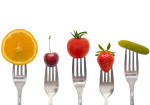|
2007/08/31, 03:09 PM
Nice article for those who have questions about snacking in between meals...
snacks that energize you
Snacking doesn't deserve its bad reputation. A healthy snack with limited calories can energize you and even help you eat less at meals. Even the American Dietetic Association recommends it: "If your energy level takes a nosedive every afternoon, take a snack break to give yourself a boost. People often feel guilty about snacking, but healthful eating between meals can be a real bonus." "Going too long without food, letting yourself get too hungry, leads to making poor eating choices such as foods high in simple carbohydrates," says Neal Spruce, CEO and founder of Apex Fitness. So snack before you're famished and don't forego snacks, or you'll eat too much at meals.
the best and the worst
Of course, snacking should have guidelines. "The worst possible snack is straight carbohydrates on an empty stomach. If you eat something like a cupcake, initially you'll get a sugar rush and then soon become tired," Spruce says.
"These kind of snacks bring rapid ups and down in blood sugar levels." And they're not very nutritious. Spruce recommends energy bars and drinks because they're structured for athletes and exercisers. Plus they're prepackaged, which makes portion control easy. But he cautions not to snack immediately before vigorous activity. "I coach kids' football. For the best performance, I instruct the kids to eat a big meal three hours before the game and then eat an energy bar 45 minutes before the game. This gives them ongoing energy."
Liquid energy drinks don't take as long to digest; drink those up to 15 minutes before working out.
"About the only thing I recommend before a workout, other than energy bars or drinks, is non-fibrous fruit. That also should be eaten 45 minutes before the workout," Spruce says.
the perfect formula
In general, the profile of a good snack consists of: 25 grams carbohydrates, 8 to 15 grams protein and up to 5 grams of fat. Calculate .5 to .9 grams of carbohydrate per pound of body weight and eat only low to moderate protein or fat. For example, a 150-pound person should have from 30 to no more than 75 grams of carbohydrates in their energy meal; on the lower side for the moderately active and higher for the very athletic or endurance athlete.
Longer cardio sessions warrant higher carb snacks, while anaerobic activity, such as lifting, doesn't require a lot of carbs.
No matter how healthy your snack, you still have to watch those calories. Spruce recommends anywhere between 150 to 250 calories, based on your size and how hard that you work out. If you're unsure about the amount of calories in your snack, check the nutrition label, consult with your trainer or use a calorie calculator like the one found at The Calorie Control Council.
"Whatever your total calorie intake goal, that's the number that you have to work with," says Spruce. "If it's 2000 total calories, you'll have to subtract the 200 calorie bar you're eating before the workout." But that calorie investment is well spent. "Snacks help satiate you so that you don't overeat at meals."
Always remember to work within your calorie limit. Besides causing weight gain, eating too much can sap your energy!
pre-workout snacks
* Energy bars
* Energy drinks
* Small amount of fruit, such as half a banana
snacks for days when you're not working out
* Cottage cheese with fruit
* Bagel with low-fat peanut butter
* Cup of non-fat plain yogurt with fruit
* Low-fat cheese on wheat crackers
Neal Spruce is chairman of the board for the prestigious National Academy of Sports Medicine (NASM) and CEO and founder of Apex Fitness Group. 24 Hour Fitness sells Apex sports nutrition products in its clubs and online.
--------------
Bettia
Life is all about timing... the unreachable becomes reachable, the unavailable become available, the unattainable... attainable. Have the patience, wait it out It is all about timing.
-Stacey Chapman
|


